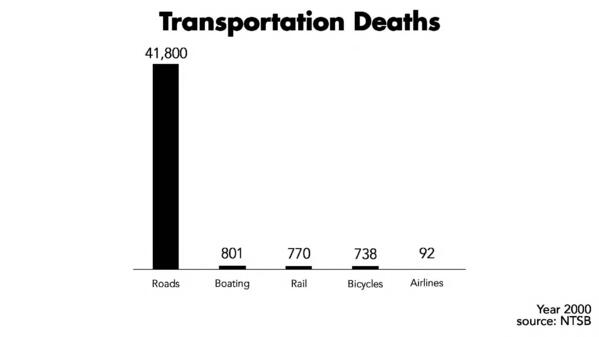Government Delays Flights
A Commentary By John Stossel
Planning to fly this summer? Good luck.
Delays are up. Cancellations, too.
Why? Because of the pilot shortage.
A pilot shortage? How can this be? Flying is a popular job. Some people fly small planes just for fun. Why aren't there enough commercial pilots?
Because the government passed another dumb law.
In 2009, after a Colgan Air crash near Buffalo, New York, killed 50 people, Congress decided that airlines could only hire aspiring commercial pilots who already had lots of flight time.
Instead of 250 hours, now they have to have 1,500 hours!
"That never made any sense," says current commercial airline pilot Tracy Price in my new video.
The sixfold increase wouldn't have prevented the Colgan crash. Those pilots had many more than 1,500 hours of flight time. The pilot had 3,379 -- the co-pilot, 2,244.
That didn't matter to the politicians. "We need to improve pilot training, address flight crew hours and service," said Sen. Frank Lautenberg.
Demanding more pre-hire flight time discouraged people from trying to become pilots. It had "the effect of pulling up the ladder," says Price.
Few people have the time or money to get 1,500 hours in the air before they can even apply for a job. The number of certified pilots fell even as flight demand increased.
The pilots unions didn't object.
"Fewer applicants means higher pay," explains Price.
I say to Price, "This rule is good for you!"
"Great for me (and other) professional pilots," he replies. "If you believe in freedom though, it's a bit of an issue."
The union blamed the pilot shortage on poor pay at regional airlines, so I push back at Price, "Some of these regional airlines were paying pilots as little as $21,000 a year."
"(But) there was no shortage of applicants!" Price responds. "Plenty of people were willing to take fairly low pay and live with roommates for a year or two to gain that really valuable jet experience."
Today's required 1,500 hours doesn't even create better pilots. Actual pilots get trained in simulators today. The computerized cockpit gives them more useful experience than unsupervised hours of hobby flying.
In fact, those hours may leave pilots less prepared. "Flight time does not equal experience," Faye Black of the Regional Airline Association told Congress. "We waste a lot of time in training, breaking bad habits pilots acquire while trying to quickly get to 1,500 hours."
The politicians ignored her.
That's not surprising. Once government creates new rules, those rules tend to live forever.
Many are just unnecessary. Airlines don't want to kill their customers, and pilots don't want to kill themselves, so they self-regulate.
The last fatal commercial airline crash was 13 years ago. Flying is much safer than driving, biking, and taking a bus or train.
"Safer than any mode of conveyance ever, including walking," says Price.
But politicians believe that if they're not passing more rules, they're not doing their job.
So expect more flight delays this summer.
"I spend a lot more time than I want to making announcements to people apologizing for being late," says Price. "We should be looking for ways to expand the availability of airline travel to more people so more people can take advantage of this amazingly safe way to get from A to B."
John Stossel is creator of Stossel TV and author of "Give Me a Break: How I Exposed Hucksters, Cheats, and Scam Artists and Became the Scourge of the Liberal Media." For other Creators Syndicate writers and cartoonists, visit www.creators.com.
COPYRIGHT 2022 BY JFS PRODUCTIONS INC.
See Other Political Commentaries.
See Other Commentaries by John Stossel.
Views expressed in this column are those of the author, not those of Rasmussen Reports. Comments about this content should be directed to the author or syndicate.
Rasmussen Reports is a media company specializing in the collection, publication and distribution of public opinion information.
We conduct public opinion polls on a variety of topics to inform our audience on events in the news and other topics of interest. To ensure editorial control and independence, we pay for the polls ourselves and generate revenue through the sale of subscriptions, sponsorships, and advertising. Nightly polling on politics, business and lifestyle topics provides the content to update the Rasmussen Reports web site many times each day. If it's in the news, it's in our polls. Additionally, the data drives a daily update newsletter and various media outlets across the country.
Some information, including the Rasmussen Reports daily Presidential Tracking Poll and commentaries are available for free to the general public. Subscriptions are available for $4.95 a month or 34.95 a year that provide subscribers with exclusive access to more than 20 stories per week on upcoming elections, consumer confidence, and issues that affect us all. For those who are really into the numbers, Platinum Members can review demographic crosstabs and a full history of our data.
To learn more about our methodology, click here.




